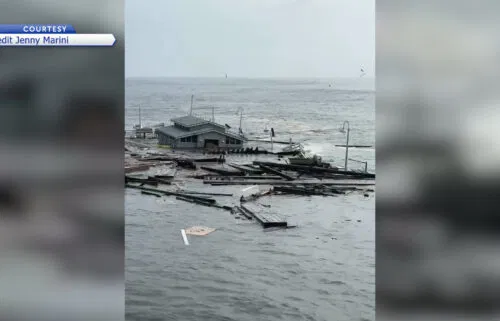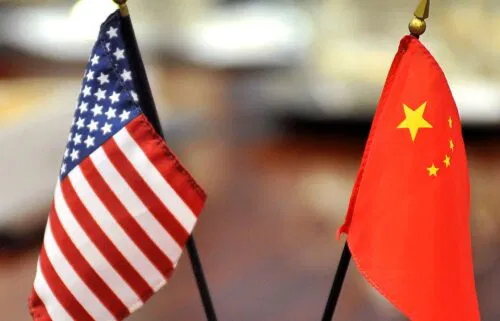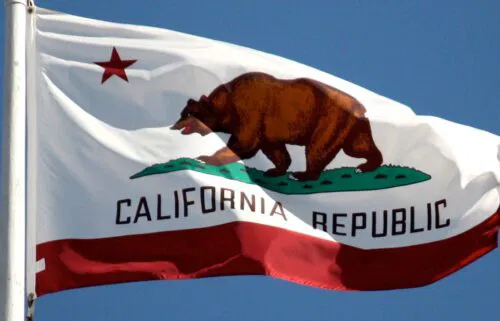California subpoenas ExxonMobil in probe of plastics waste
By DON THOMPSON
Associated Press
SACRAMENTO, Calif. (AP) — California’s attorney general on Thursday subpoenaed ExxonMobil as part of what he called a first-of-its-kind broader investigation into the petroleum industry for its alleged role in causing a global plastic pollution crisis, allegations that the company called meritless.
Attorney General Rob Bonta said the industry for decades has encouraged the development and use of petroleum-based plastic products while seeking to minimize public understanding that their widespread use harms the environment and public health.
“Every week, we consume the equivalent of a credit cards worth of plastic through the water we drink, the food we eat, and the air we breathe,” he said, citing a 2019 study for the World Wide Fund For Nature environmental group.
Bonta will consider whether petrochemical companies violated the law with what he called their “historic and ongoing efforts to deceive the public.” Bonta said ExxonMobil was subpoenaed as a major source of global plastics pollution and for its alleged prominent role in public deception regarding plastics.
ExxonMobil said in a statement that it is “focused on solutions and meritless allegations like these distract from the important collaborative work that is underway” with governments worldwide, including California.
The company said it is the first to have “commercial-scale advanced recycling technology” at a major facility to convert used plastic into material that can be used to make new plastic.
The American Chemistry Council representing plastics makers issued a statement saying that U.S. “plastic makers are committed to a more sustainable future and have proposed comprehensive and bold actions at the state, federal, and international levels.”
Initiatives the industry group said it supports include requiring all plastic packaging in the U.S. by 2030 to include at least 30% recycled plastic; making producers responsible for packaging to help increase recycling; and supporting a legally binding global agreement to confront the problem.
But Bonta said the industry appears to have engaged in “greenwashing” for decades by leading consumers to believe that plastics were environmentally friendly — largely because they can be recycled.
That marketing effort made “people comfortable to consume more and purchase more plastic,” he said. “And that is really the heart of the deception that we’re going to investigate.”
Companies may have violated laws barring unfair competition, deceptive business practices, or making “greenwashing” illegal, Bonta said.
A civil lawsuit could potentially seek fines or damages, but Bonta said his main goal is a legal order or a settlement requiring companies to clean up plastic waste, make plastics manufacturing changes and promote “non-deceptive ways of talking about plastics.”
“We’re really looking at the underlying issue of non-recyclability, essentially, of plastics, and that is a major problem,” Bonta said. “And we’re investigating whether that was fueled by a decades-old campaign of deception.”
There is no timeline for the completion of the investigation, but Bonta said it is proceeding “with a level of urgency.”
Bonta’s move comes amid growing awareness of the pervasiveness of discarded plastics and the role of “microplastic” waste in the food chain.
Scientists are still studying the extent and human harm from tiny bits of broken-down plastic, some so small that they are invisible to the naked eye.
The National Academy of Sciences said in December that the United States — the world’s top plastics waste producer — should reduce its plastics production because so much winds up in the ocean and other waterways.
Like Bonta, the scientists have said that recycling won’t solve the problem. Most plastic cannot be recycled and overall recycling rates have never exceeded 9%, said Bonta. The rest is incinerated, put into landfills or escapes into the environment.
California is among states that have struggled to encourage recycling against market headwinds and to sort out products that can readily be reused.
California banned single-use plastic bags and is discouraging the use of drinking straws, plastic utensils and condiment packages.
The Los Angeles City Council this week approved 14 measures further restricting the use of plastic bags, utensils and containers at city properties and events. Los Angeles County supervisors last week restricted single-use plastic products.
California spends about $500 million each year to clean up plastic pollution in waterways and along beaches, said Bonta, a Democrat who is running for reelection this year. He announced the investigation with an ocean backdrop at Dockweiler State Beach in Southern California.
Petrochemical companies have ramped up plastics production as the use of fossil fuels is gradually replaced by renewable energy, he said. About 1.5 million tons of plastic produced globally on an annual basis in the 1950s. The amount is now more than 300 million tons annually.
The Center for Biological Diversity called Bonta’s investigation “a crucial step,” but said plastic and its production is ultimately incompatible with a healthy planet.
“We have to stop producing plastic junk,” the group said in a statement.



